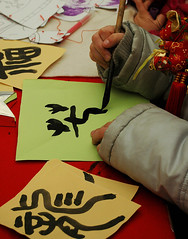No Excuse Not to Learn in China
Many an eager young laowai has arrived in China with the goal of learning the language. This is an undertaking I whole-heartedly support. But why stop with Chinese? Human labor is high in supply and low in price here, and this principle applies to all kinds of teaching and training services as well.
What can you learn in China besides Chinese? Tons of things. Here are some examples:
- Cooking (there are a million styles of Chinese cuisine, appreciated all over the world)
- Musical instruments (eastern or western, from guzhen or erhu to drums or guitar, it’s all here)
- Sports & martial arts (from tennis or soccer to tai chi or even taekwondo)
- Art (drawing, painting, scultpure, calligraphy, etc.)
- Chess, Chinese chess (象棋), go (围棋), “Connect Five” (五子棋), mahjongg (麻将) etc.
- Other foreign languages or dialects (rather high Chinese level recommended)
The more international your city, the more your options. For example, I know one person studying taekwondo in Shanghai, but taekwondo, not being Chinese, is probably not an option everywhere in China, whereas cooking and musical instruments will be.
I had better head off a few excuses here:
Language is not a huge issue. If you’re a student of Chinese, using and hearing Chinese to learn something else will only enhance and accelerate your acquisition of Chinese. The more physically demonstrable the subject matter (e.g. cooking or musical instruments), the less your Chinese ability will matter. If you’re not studying Chinese or are really just way too early in your studies to apply it to another field of study, you should still be able to find a teacher. Tutoring an English-speaking foreigner is an opportunity that many teachers will jump at; it allows them to practice their English while focusing on exactly the language that applies to their field of expertise.
There are channels to help you find tutors. The Chinese way is to start by asking your friends and acquaintances for recommendations or introductions. In addition, some universities provide cheap tutoring services by offering their students as tutors, and collecting only a small processing fee. Going through such an agency makes it easier to switch tutors if necessary and to add additional study subjects if you so wish. (My alma mater, East China Normal University in Shanghai, offers such a service. I’ve used it in the past, and can attest to both its affordability and effectiveness.) There are also small companies which offer various kinds of tutoring or training at market rates; just ask for some help in finding them.
You have time if you’re really interested. I’ve been feeling especially busy with work lately, but I’m not a machine, so I still take time to relax at night. Watching DVDs or surfing the net are two ways to unwind, but if I’m taking lessons in something I genuinely enjoy, it’s a much more satisfying way to spend my free time. So I’ve just recently signed up for a weekly piano lesson in a small school near my home. (Click here to see what the school charges for lessons.)
I’ve always regretted not studying piano (or some instrument) when I was younger. China has given me a very affordable second chance, although I didn’t recognize it immediately. If, like me, you live in China and have been wanting to take lessons of some kind but denying yourself for some reason or another, hopefully this little nudge will help you to get out there and start learning!



Some good ideas here! One of the best things I did in Beijing was take guitar lessons from a Beijinger who had studied in a conservatory in Barcelona for a few years in the 1980s. He only spoke Chinese and Spanish – helped both my Chinese and my guitar playing immensely. Unfortunately, haven’t yet found a suitable replacement in Shanghai.
You sold me. I’m going to go ahead and find that kung-fu class I’ve been talking about for the past two and half years.
(re: typo in post: 围棋 is Go… 五子棋 is an excellent game that I don’t know how to say in English… I often use “5 stone,” but I may have made that up…)
Interesting that guitar classes are twice as expensive per hour as piano. Less teachers, or more demand?
It seems that for most people, in China (Chinese and foreign) and abroad, the idea of specifically learning something after graduating from school is a wild, strange concept. People learn all the time at work and stuff, of course, but most don’t consider that “learning,” and are more likely to just veg out after work than to commit themselves to picking up a new skill.
I’d actually rather like to learn how to cook. I’m decent (the dishes I can make are palatable, but limited), but I really enjoy doing it. Maybe I’ll look into it.
Last year I was tempted to buy an erhu and see if I could offer a street corner beggar 15 kuai to teach me. The local music school wanted 80 or so an hour.
Andrew,
Wow, sounds like a great find! I think you can do it in Shanghai, but it might take a good amount of looking.
Jonathan,
Oops! Right you are. I meant to put both, but mixed them up. I call 五子棋 “Connect Five.” It’s kind of like a flat version of the old Milton Bradley (?) classic Connect Four… except without the gravity dynamic.
Inspirational post and awesome advice John. I’ve been meaning to take some Guzheng lessons for ages – I think you’ve just given me the kick in the pants I needed. Cheers!
Related to taekwondo, I studied Kendo (Japanese fencing) for a while and really enjoyed it. It was quite easy to find a teacher here in Suzhou, as there is a large Japanese population. I imagine that the same goes for Korean martial arts like taekwondo in most cities that have large Korean or Japanese populations.
I have been learning stuff on the side for years, as you probably know already. Learning is a hobby for me.. learning CHinese now is just as much a hobby for me as learning to write computer programs were when I was 6 years old; and just as much a hobby as learning guitar and I am still learning all of those things and still find them all just as fascinating as when I first began them.
I get a lot of satisfaction from learning because you can do something with the skill.. sure, playing computer games really well is fun and in some cases can provide reasoning and logic skills or in the case of Wii Fit, can increase fitness levels but they are not really skills you can directly apply. I’d much prefer to learning a new thing on guitar (or music theory in general) then play Guitar Hero.. I enjoy the learning and exploring with music rather than the sound created from the guitar itself.
So how did the piano lesson go? 🙂
Yeah – it was fantastic, not to mention a lot of fun. It will take more looking in Shanghai for sure. Beijing is a much better town for music, especially classical. Of course, I haven’t been looking that hard. I have, however, found pretty good shop for classical guitars on Jinling Dong Lu (#200): 上海东韵琴行 . I’d recommend anyone looking for a guitar to talk to 杜杰, the guitar guy there. He’s got some beautiful Spanish classical instruments, and he’s happy to let people try them out.
I couldn’t agree more. I’m looking for a Burmese tutor right now — this would be no big thing in my old home, Yunnan, but now that I’m in Beijing it’s a bit difficult. A few people have recommended posting signs at 民族大学 or other major Universities… this post has given me the motivation to actually go out to Wudaokou and do it this weekend.
So I’m gonna break down and admit that I bought a guzhen (yes, I know it’s a “girl’s” instrument) and learned to play it with lessons here. In my class I was the only guy out of fifteen 8-yr old girls, but I wanted to learn a Chinese instrument and the guzhen was the only one that didn’t sound like nails on a chalkboard to me. It was fun for a time until I realized that:
1) all my Chinese were making fun of me and
2) it is going to be next to impossible to safely get this sent home. Even if I can, who could fix it if it breaks or where can I buy new strings?
I do agree with you, though, that learning other parts of the culture besides just the language can be so rewarding. Great post and I hope your piano lessons go well.
Thats so awesome. i was one of those little kids who was forced into piano at a young age, but one of a minority who never stopped (I’ve been playing since I was 5!)
Throughout my life people have always been saying “It must be so nice to play an instrument, I wish I could learn”. I always reply “Why don’t you try then?” to which they mumble something about not enough time… I’m not talented.. etc. I admire you, you’re one of only a few who said “Why the hell not!”.
PS Did you know that incidents of tone deafness among mandarin speakers is one of the lowest in the world? I’m sure your knowledgef of a tonal language will help.
A very inspirational post. I have started to think that learning might be a way of life and I think I will go on an learn stuff even after my studies. Thanks for the tips.
Good ideas! I’m just starting Tai Chi, but I also really want to learn calligraphy and the erhu, and this is helping give me the push I need to do so. 🙂
Also, isn’t it guzheng (with a g at the end)?
Very inspiring! Actually, in my opinion not only will learning the other skill be a plus, but it will probably improve your Chinese more than just studying a textbook would. In the case of physical activities, I think the new words are driven home more because they actually mean more to you.
I’ve always wanted to play piano as well, maybe I’ll try it out!
I, too, agree.
You mean “古筝”/”guzheng,” right? There’s a “g” at the end in Pinyin. Lovely instrument! I first noticed it watching the music video to Jay Chou’s “菊花台,” which is also a really beautiful, soulful song. I’d like to learn how to play the guzheng someday, though I’m not sure whether I have any musical talent what-so-ever. Maybe when I actually get the chance to go to China. If I can’t play it, I’d at least enjoy watching other people play it.
Some of my classmates here in North Carolina actually formed a go team. I’d like to learn to play xiangqi myself.
awesome article !!!
John, would be cool if you did a top 5 places to have a burger
in shanghai review !!!!!!